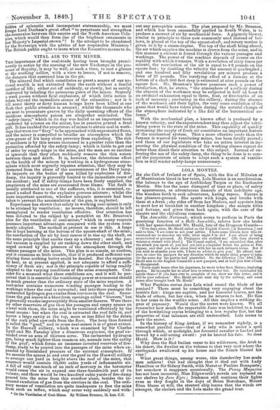LOLA MONTEZ.
BE she Celt of Ireland or of Spain, with the fire of Milesian or of Mauritanian blood in her veins, Lola Montez is an anachronism. She belongs to the age of Archbishop Turpin or the Enchanter Merlin. She has the same disregard of time or place, of safety or appearances, as adventurous damsels of that indefinite age. She wanders forth to seek adventures, hating repose. Europe is her pleasure-ground. She sports with kings, and breaks with them at a freak ; • she rides off from her Medoro, and appoints him to meet her at break fast in another kingdom ; she accepts titles and fortune, and gives them back again, with the ease of the theatre and the chivalrous romance.
The Assembles Nationale, which seems to perform in Paris the gossiping function of a Belle Assemblee, relates how she broke with her quasi-husband Mr. Heald, late of the Dragoon G uards- " Five days since, Mr. Heald called on the English Consul, [at Barcelona,] and said to him, am come to ask your advice. I have some friends here who re- commend me to abandon my wife; what ought Ito do? I am afraid of being assassinated or poisoned. At Perpignan she stabbed me.' (He then showed a waistcoat stained with blood.) The Consul replied, ' I am astonished that, after the attack you speak of, you had not laid a complaint before the police at Per- pignan, and that you have since lived with her on such intimate terms. But if you wish to abandon your wife, I have no advice to give you.' He offered, how- ever, to viser his passport for any direction which he might think proper to take. On the same day the parties had quarrelled. On the following [the 18th] Mr. Heald sent to the English Consul for a new passport, and at half-past four o'clock he disappeared. "Forty-eight hours after his departure, he wrote to her from Mataro, imploring pardon. He besought her to allow him to return to her feet. He terminated his epistle thus—' If you have ever to complain of me, show me this letter, and it will be your talisman.' Mrs. Heald set out next day by the railway, and some hours after brought back Mr. Heald."
What Paphian cestus does Lola wind round the blade of her poniard ? There must be something very engaging about the terrible fair : kings are captive, and her Lancelot braves, not the blade of others, but her own, when he returns to her. He flies to her arms in the warlike sense. All this implies a striking de- gree of piquancy. Would that the secret were known. We all remember how much the respectable Juno was indebted to a loan of the bewitching cestus belonging. to a less regular fair, but the properties of that talisman are still undescribed. Lola seems to have the secret.
In the history of King Arthur, if we remember rightly, is a somewhat parallel case—that of a lady who is under a spell through which, at midnight, her favoured cavalier is hacked and hewed by a self-acting sword : yet he braved his fate. So does Heald. How is it ?
Why does the Red Indian recur to his wilderness, the Arab to his desert, the dweller on the volcano to that very spot where the earthquake swallowed up his house and the flames blasted his vine ?
What great things, among worse, this daredevilry has made men achieve! One had thought that it died out with Lady Hamilton or Sir Sidney Smith, with Murat or Pauline Bonaparte; but somehow it reappears occasionally. The Penny Magazine has not been immortal, Miss Edgeworth's novels are replaced on our shelves by Jane Eyre; Irishmen still continue their fights
i
even as they fought in the days of Brien Boroihme, Mount Etna blazes at will, the stoutest ship learns that the winds are stronger, the cholera and the Lola make the grand tour.


























 Previous page
Previous page